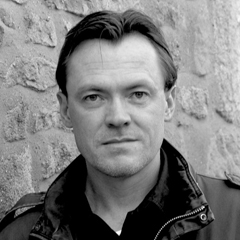 |
Harry Whitehead
LEICESTER WRITER
|
|
|
Profile
Harry Whitehead is a novelist and lectures in creative writing at the University of Leicester where he is Deputy Director of the Centre for New Writing. Born in London, he grew up in the home his mother founded and ran for disturbed children. He spent several years in the Far East before coming back to do a degree in anthropology at Sussex and then an MSc in medical anthropology at University College London. He worked for many years in the film business as an assistant director, location scout and manager. At the same time, he studied for an MA in creative writing at Birkbeck and then a PhD at Lancaster University, teaching and writing when he could.
Harry’s first novel, The Cannibal Spirit (Penguin Canada), is a fictionalization of the true story of George Hunt, a First Nations Canadian who was tried for cannibalism in 1900 in Vancouver. The product of some fifteen years of historical and ethnographic research, the novel went through various manifestations as academic article, biography, film script and theatre play before coalescing into its final form. Widely critically reviewed, it has been described as 'powerful, brave, ambitious' (The Globe and Mail), 'a thriller with a Joseph Conradian plot' (The Walrus), 'a unique work, compelling, complex, thought-provoking and impressive' (Quill and Quire). He has also published poetry, short stories, articles and essays. Harry recently finished his second novel, Nowhere, the story of a film location scout who is asked to find ‘nowhere’, and the brilliant woman he meets when he gets there. ‘There’? Where? Nowhere. And it starts to get complex… |
Creative Work
From The Cannibal Spirit
And I am guilty. Disgusting Orgies? I am guilty of it all. Blood dripping off my godless fangs, black in the flame-light roaring in the centre of the greathouse. Cavorting heathens. Me: legs kicking up, naked member swinging, masks of bear and wolf and raven turning all about, carved wood mouths clack-clacking. My fingers clutching at some poor waif, his blue eyes wide-open-terrified, fed on blood and liver till he was fattened up sufficient for the pot. A blow from a blade, and the fair-haired little wretch’s organs spill out on the ground for my appreciation. Me—with all them naked savages about me, screeching and hollering—here’s me scrabbling in the dirt to raise up a steaming kidney, a liver, a heart.
My name is George Hunt: Indian Man-Eater, Mutilator of Corpses, Cannibal—and Man of Reason. There’s the rub.
|
Reflection
This is the opening of my novel, The Cannibal Spirit. As an internal monologue, I liked beginning with the word ‘and’. There is a ‘hookiness’ to it – the reader is immediately in the middle of things. ‘Disgusting orgies’ refers to a newspaper headline—a real one from the time of his trial—and is contextualixed as such shortly after. George Hunt had a First Nations mother but a white father, and the novel is concerned with the crisis of identity he suffers in the colonial environment of the Northwest Coast of Canada in 1900. He was both a shaman and chieftain as well as an anthropologist and scientific researcher. So the ironic tone of this extract, the child being white, the hollering savages, reflects his duality, his opinions on how one side of his world is perceived by the other, and how ridiculous (and terrible) that world has become. The space of the greathouse will be alien to most of those who read this passage, and I am deliberately playing with readerly presumption—particularly of the sort that may feel uneasy with such a depiction as I have written it here (or Hunt has spoken it). Of course, I hope it is also suitably vivid and intense to spark the readers’ interest and draw them on, even as they are unsure about what the hell is going on. This is ‘news from elsewhere’, mediated through an unfamiliar voice – a voice that has been loved and hated in almost equal measure by reviewers. I don’t mind. Hunt is true to my vision of him and the space of his world – both creatively and morally. As a writer of fiction, that is all I can do.
|
Publications
Novel
The Cannibal Spirit, Toronto: Hamish Hamilton [Penguin], 2011
Short Fiction
Bond is Back, MIR Journal Vol. 2, 2005
Dr Pershing Becomes a Dinosaur, The Storyteller Magazine, Vol 13, Issue 4, 2007
Sharp, runner up in Virago’s ‘Short Fiction for Women’ competition, 2007
Black Amex and Chop, Whimperbang Vol. 10, 2007.
Dust, The Storyteller Magazine, Vol 14, Issue 2, 2008.
How Arif Learned to Hear, shortlisted for ‘Fish Historical Short Fiction Prize’ 2008.
Sharp, at Hags, Harlots and Heroines Sep 2010
Ringtone, London Lies: an Anthology, edited by Cherry Potts (London: Arachne Press), 2012
Articles
The Hunt for Quesalid: Tracking Lévi-Strauss’ Shaman, Anthropology and Medicine, Vol. 7, No. 2 August 2000
Quest for Quesalid: Myth-Making and Rationality in the Initiation of a Shaman, in Georganta et.al. (eds.), The Apothecary’s Chest: Magic, Art and Medication. Cambridge: CSP., 2009
Yearning for Authenticity on the Northwest Coast of Canada, Memory Studies, July 2010
Cormac McCarthy’s Blood Meridian: a Review, The National Post (Canada) October 21, 2011
Harry Whitehead on his Novel The Cannibal Spirit, http://blog.indigo.ca/fiction/item/705-harry-whitehead-on-his-novel-the-cannibal-spirit.html October 2011
Nomadic Emergence: Creative Writing Theory and Practice-Led Research, in New Ideas for the Writing Arts, edited by Graeme Harper (Cambridge: CSP, 2013)
Contact & Links
Email: harrywhitehead@me.com
Agent website: http://www.blakefriedmann.co.uk/
|
|





